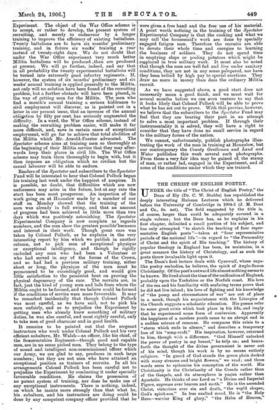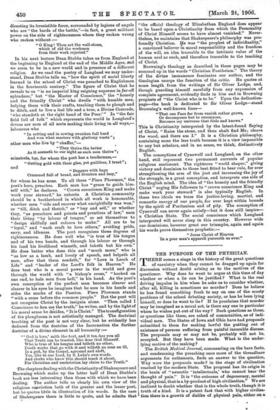THE CHRIST OF ENGLISH POETRY. u - NDER the title of "
The Christ of English Poetry," the Dean of Ely (Dr. C. W. Stubbs) has republished the deeply interesting Hulsean Lectures which he delivered before the University of Cambridge in 1904-5 (J. M. Dent and Co., 6s. net). The field suggested by the title is, of course, larger than could be adequately covered in a single volume; but the Dean has, as he explains' in his first chapter, delimited a small portion of his subject, and has only attempted " to sketch the teaching of four repre- sentative English poets "—taken at " four representative periods of the national life "—in regard to "the Personality of Christ and the spirit of His teaching." The history of popular theology in England has been, he maintains, 'in a great measure the history of Christology, and as such the poets throW invaluable light upon it. The Dean's firs 1 lecture deals with Cynewulf, whose Saga- like poetry embodies, he believes, the spirit of Anglo-Saxon Christianity. Of the poet's outward life almost nothing seems to be known. He lived about the time of the unification of England, probably upon the Yorkshire or the Norfolk coast. His love of the sea and his familiarity with seafaring terms prove that he did not live inland; his love of fighting and his knowledge of "the pomp and circumstance of war" are out of place in a monk, though his acquaintance with the Liturgies of the Church suggests a scholastic education. His poems refer to some great crisis which took place in his life, and imply that he experienced some form of conversion. Apparently the happiness of a careless youth came to an abrupt end in a sudden seizure of remorse. He compares this crisis to a "storm. which ends in silence," and describes a temporary loss of his "song-craft." His inspiration, however, returned to him, though with a difference. "God Himself unlocked the power of poetry in my breast," he tells us; and hence- forth the thought of the divine government is never out of his mind, though his work is by no means entirely religious. "In guard of God stands the green plain decked with many streams and bright flowers," we read; and these words seem to epitomise his conception of the world. His Christianity is the Christianity of the Creeds rather than of the Gospels, and its atmosphere is pagan rather than' Apostolic. He thinks of our Lord as " a Divine and Imperial Figure, supreme over heaven and earth." Fie is the ascended Christ, victorious over sin and death, "the world shaper, God's spirit-son." In less exalted mood, He is "the Holy Hero—warrior King of glory," " the Helm of Heaven,"
directing its irresistible force, surrounded by legions of angels who are " the bards of the battle,"—in fact, a great militant power on the side of righteousness whom they reckon wrong who reckon without :- " 0 King! Thou art the wall-stone, which of old the workmen from their work rejected."
In his next lecture Dean Stubbs takes us from England at the beginning to England at the end of the Middle Ages, and we seem to be in a new world and in presence of a different religion. As we read the poetry of Langland we may under- stand, Dean Stubbs tells us, "how the spirit of social liberty learned in the school of Christ was preached to Englishmen in the fourteenth century." The figure of Christ that he reveals to us " is no imperial king reigning supreme in far-off splendour," but " the Master of Conscience," the " homely and the friendly Christ" who dwells "with humble men, helping them with their crafts, teaching them to plough and to ditch, and to live a leal life and a true, a Divine Comrade, who standeth at the right hand of the Poor.' " In " the fair field full of folk" which represents the world in Langland's dream are men of all sorts making their living in all ways,— labourers who "In setting and in sowing swonken full hard • And won what masters with gluttony waste"; other men who live by " chaffer,"— • " They thrive the better As it seemeth to our sight as such men thrive"; minstrels, tqo, for whom the poet has a tenderness,— " Getting gold with their glee, yet guiltless, I trust"; and " Beggars with bags Crammed full of bread, and drunken and lazy," for whom he has none. To all these "Piers Plowman," the poet's hero, preaches. Each man has "grace to guide him- self with," he declares. " Crown conscience King and make work your steward," he exhorts. A Christian community should be a brotherhood in which all work is honourable, whether men " ride and recover what unrightfully was won," or " till, ditch and thatch," or " buy and sell," or whether they, "as preachers and priests and prentices of law," earn their living "by labour of tongue," or set themselves to "design skilfully and colours to make." All are to be " loyal," and " each craft to love others," avoiding pride, envy, and idleness. The poet recognises three degrees of righteousness. He does well who "is true of his tongue and of his two hands, and through his labour or through his land his livelihood winneth, and taketh but his own."
He does better who does this and "much more," who is "as low as a lamb, and lovely of speech, and belpeth all men, after that them needeth," for " Love is Leech of Life" and "leader of the Lord's folk in Heaven." He does best who is a moral power in the world and goes through the world with "a bishop's cross," "hooked on one end, to hale men from hell," in his hand. As the poet's own conception of the perfect man becomes clearer and clearer in his eyes be imagines that he sees in his hands and sides the marks of the Passion. Piers Plowman stands "with a cross before the common people." But the poet will not recognise Christ by the insignia alone. "Then called I Conscience to ken me the truth," he writes, and by the light of his moral sense he decides, "It is Christ." The transfiguration of the ploughman is not artistically managed. The doctrinal teaching of the poet is not very clear, but he evidently has deduced from the doctrine of the Incarnation the further doctrine of a divine element in all humanity :— "' God is love,' saith the text, and it teaJ,hes you all That Truth can be trusted, like dear God Himself. Who is true of his tongue and telleth no other, Doeth works that go with it and willeth no man an ill, Is a god, by the Gospel, aground and aloft, Yea, like to our Lord, by S. Luke's own words. And clerks who know this should teach it about, For Christian and unchristian lay claim to the Truth."
The chapters dealing with the Christianity of Shakespeare and Browning which make up the latter half of Dean Stubbs's book are less interesting than those with which we have been dealing. The author tells us clearly his own view of the religious conviction both of the greater and the lesser poet, but he quotes little in illustration of his words. In the case of Shakespeare there is little to quote, and he admits that "the official theology of Elizabethan England does appear to be based upon a Christianity from which the Personality of Christ Himself seems to have almost vanished." Never- theless, he maintains that Shakespeare's philosophy was pro- foundly Christian. He was "the prophet of individuality," a convinced believer in moral responsibility and the freedom of the will, an idea traceable to the intrinsic value of the human soul as such, and therefore traceable to the teaching of Christ.
Browning's theology as described in these pages may be summed up in the words " Christian Pantheism." The theory of the divine immanence fascinates our author, and the theologian usurps the function of the critic. He quotes at some length from the writings of Sir Oliver Lodge, and, though guarding himself carefully from any expression of complete agreement, evidently finds in him and in Browning prophets of "the Christ who is to be." Upon the dedication-
page—the book is dedicated to Sir Oliver Lodge—stand Browning's well-known lines—
"That one Face far from vanish rather grows, • Or decomposes but to recompose, Becomes my universe that feels and knows."
This is Christianity interpreted by the latest-found Saying of Christ, "Raise the stone, and thou shalt find Me; cleave the wood, and there am I." It is a Christian philosophy, containing none the less truth because it is a view impossible to any but scholars, and in no sense, we think, distinctively English.
The conceptions of Cynewulf and Langland, on the other hand, still represent two permanent currents of popular religious sentiment. The righteous " world shaper," giving victory and dominion to those best fitted to bear rule, for ever
strengthening the arm of the just and increasing the joy of the struggle, is a great conception, and interprets one side of the English mind. The idea of "the homely and the friendly Christ " urging His followers to " crown conscience King and make work your steward" is also typically English. In these two ideals we trace the justice-loving, martial, and romantic energy of our people, for ever kept within bounds by the spirit of Puritanism and of pity. The conception of Cynewulf can never again satisfy—but it does still inspire— a Christian State. The social conscience which Langland interpreted will never sleep in this country. However wide our dominions, however great our triumphs, again and again his words prove themselves prophetic:—
"Jesus Christ of Heaven In a poor man's apparell pursueth us ever."











































 Previous page
Previous page